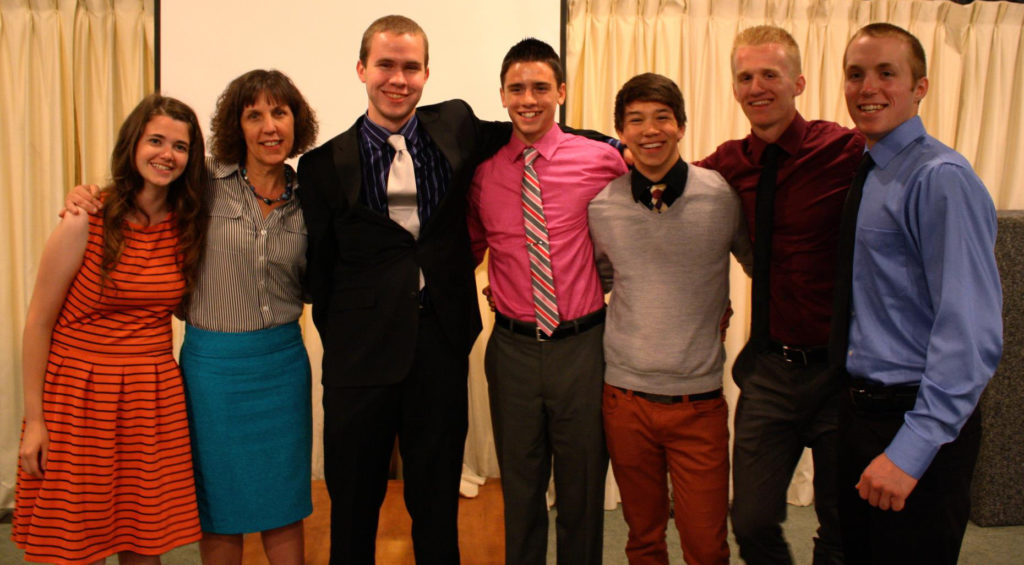Part of what keeps me sane is that while life is linear, it is also cyclical. When the days grow short and dark, I know Christmas is near; and as the school year grows long–and uniform hemlines a little short–I know that summer is coming. Every year we launch a beloved brood of seniors into a waiting world, but before they scatter to the winds outside the hallowed halls of Providence, they must first run the gauntlet that is the senior thesis—a 15-20 page argument on a debatable topic of their choosing that they write (and rewrite!), commit to memory, and then present to a panel of judges who question them on the breadth and depth of their research, original thought, and biblical thinking.
The senior thesis is a capstone event at Providence in that it draws on all previous learning. Aristotle defined rhetoric as “the faculty of discovering all the available means of persuasion in any given situation” which included a consideration of the needs, desires, and values of the audience; the credibility and good will of the speaker; and the best possible reasoning that could be pressed into service in support of the issue. Part of what our students learn in rhetoric is how to rightly understand all of the factors that play into an issue, how to weigh competing values and desires, how to summarize and organize ideas, and how to evaluate complex issues in light of Scriptural principles. To do this they must know how to read, write, think, and speak well.
But much of what we teach at Providence instills these abilities, so what makes the senior thesis the gauntlet it is reputed to be and why spend most of an academic year making students run that gauntlet? The answer is found in the Roman rhetor Quintilian’s definition of rhetoric: a good man speaking well.

Anyone can speak—especially in this day of unfiltered self-publishing and evanescent fame dependent only on enough hits of the Like button. Being heard is easy enough. Being worth listening to–not so much. At Providence, we know that the telos of authentic education is wisdom and eloquence. We teach factual knowledge, but we teach it in a way that fattens the soul rather than the ego. We know that all truth is God’s truth, and that while there can be knowledge without submitting to the Lordship of Jesus Christ, there can never be wisdom without submitting to His Lordship. To be a good man is to be a godly man bathed in biblical wisdom.
To speak well is to be skilled in both writing and speaking, so a big part of rhetoric is polishing the skills of brainstorming, reading, researching, weighing, arranging, rearranging, synthesizing, knowing when to augment, knowing when to edit—in short, becoming practiced and hopefully, comfortable with everything that goes into inventing and supporting an idea of academic importance. In addition to skillful written expression, however, we want our students to be equally skilled at oral presentation; thus over the years we train them to speak confidently and winsomely to an audience. The oral presentation element of the senior thesis is an opportunity to showcase the fruit of many years of labor by teachers, parents, and, of course, the students themselves.
And finally, because we want our students to be able to demonstrate that they are able to defend a position that have worked hard to understand and develop, as well as to be able to speak extemporaneously on a variety of logical implications arising from their position, we ask them to eloquently respond to a challenging, but benevolent spate of questions from a panel of judges drawn from both the staff and the local community.
The senior thesis is a test of character, but a good one, and while most seniors do not begin their capstone year thanking God that The Year of the Thesis is finally upon them, they almost always walk away from it feeling grateful and accomplished. Therein lies the mystery of this elusive thing we typically term “the love of learning”: The thesis often begins as an arranged marriage, with varying levels of commitment, but invariably ends up as a labor of love, and when the aim of education really is wisdom and eloquence, then labore est orare—to work is to pray—and what could be a better note on which to end a student’s years at Providence?
Thesis presentations from years past can be found on Providence’s YouTube page or read some of the papers on our website.